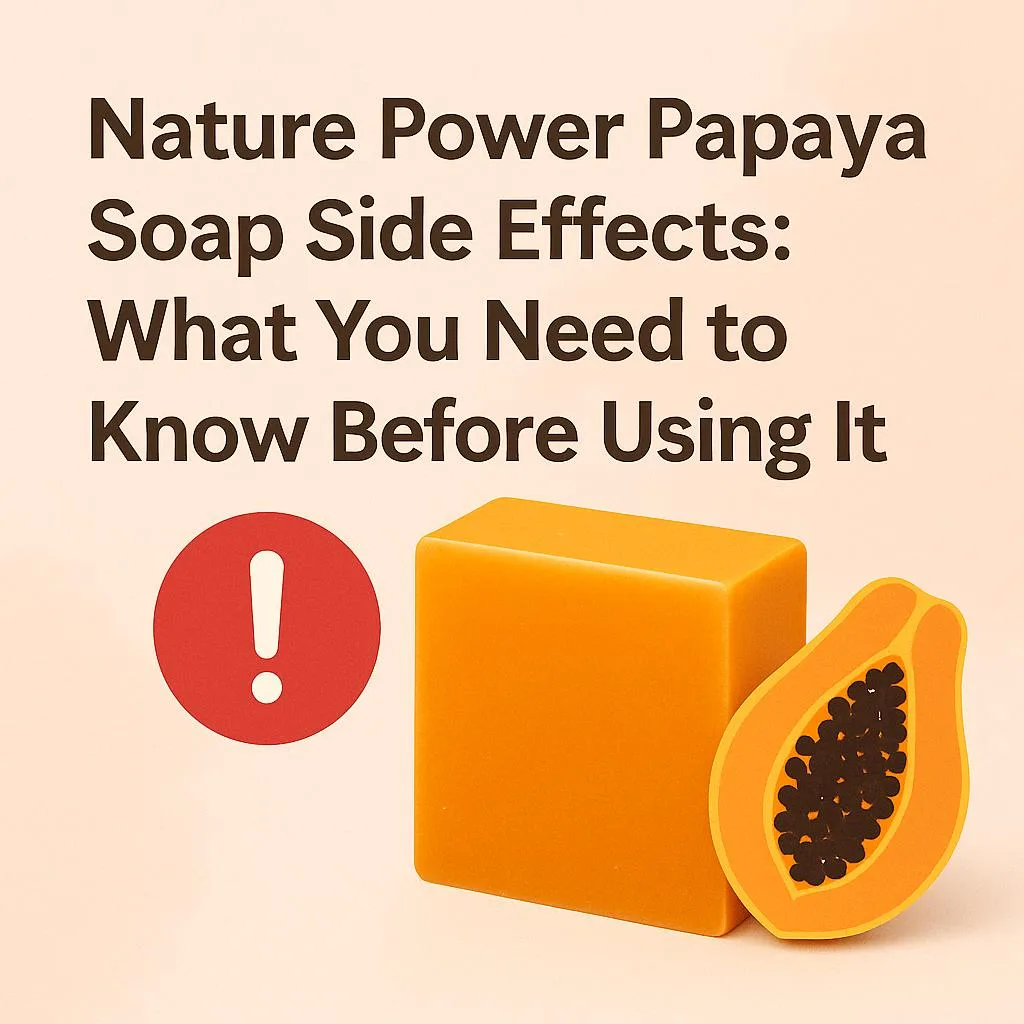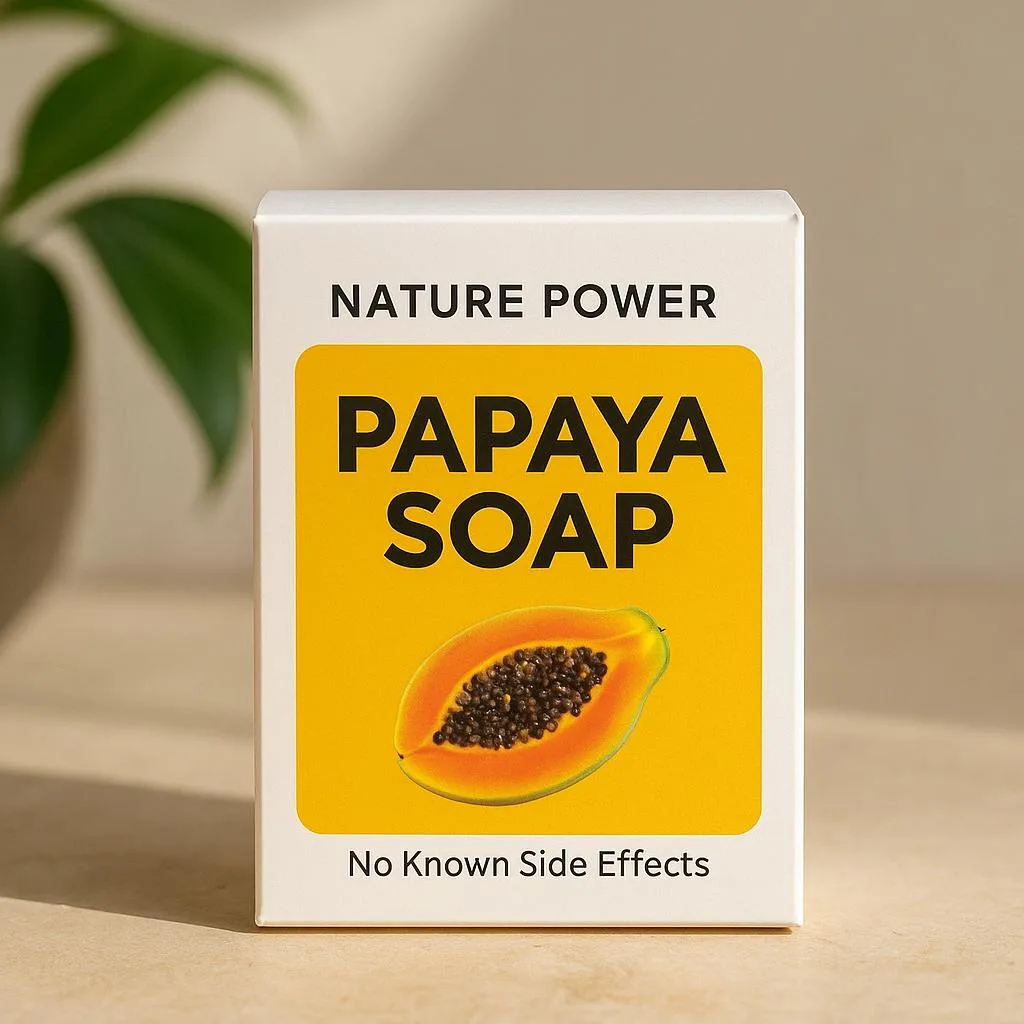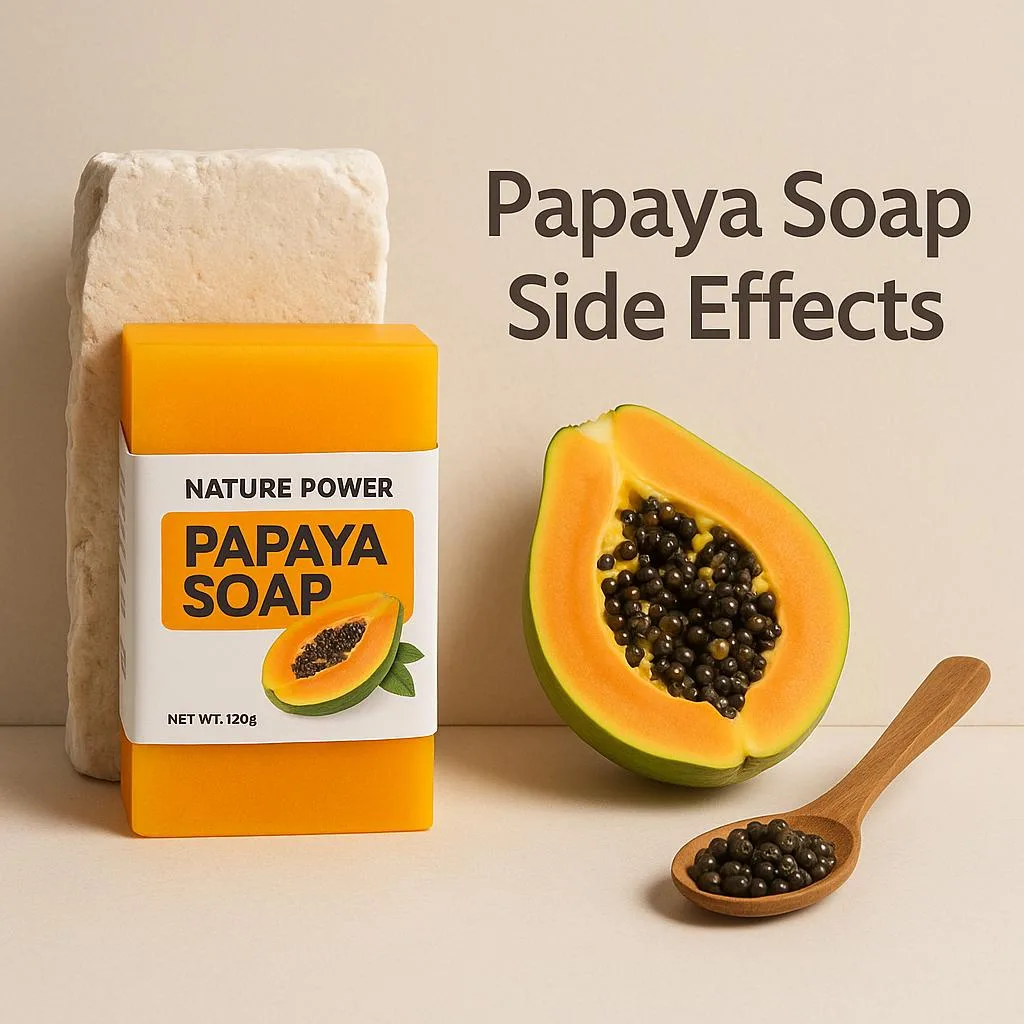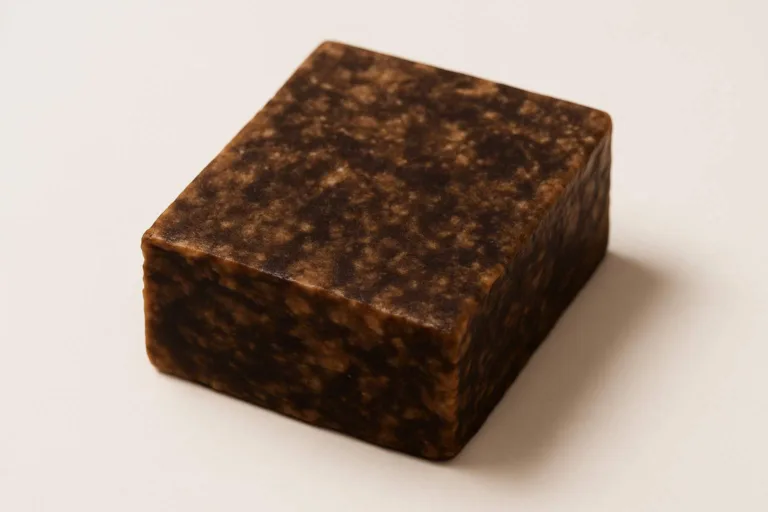In the ever – expanding landscape of natural skincare, Papaya Soap has carved out a significant niche, appealing to consumers seeking gentle yet effective cleansing and brightening solutions. Among the various brands vying for attention, Nature Power Papaya Soap has gained traction, touted for its blend of natural ingredients and promised benefits. However, like any skincare product, it’s essential to be aware of the potential Nature Power Papaya Soap Side Effects before incorporating it into your daily routine. Common side effects of Papaya Soap you should watch for This comprehensive guide will delve deep into the reported reactions, scientific explanations, and expert advice to help you make an informed decision about whether this soap is right for you.

What Is Nature Power Papaya Soap?
Nature Power Papaya Soap positions itself as a natural skincare product, leveraging the power of papaya extract as its star ingredient. Papaya is rich in papain, an enzyme known for its exfoliating properties, and many formulations of this soap also contain kojic acid, a compound celebrated for its skin – lightening abilities. Alongside these active components, the soap typically includes other ingredients such as glycerin for moisture retention, coconut oil for deep hydration, and natural fragrances to enhance the user experience.
The brand markets Nature Power Papaya Soap as a solution for a range of skin concerns. It claims to help with acne by unclogging pores, reduce the appearance of dark spots and hyperpigmentation, and improve overall skin texture and complexion. These promises have attracted a large consumer base looking for natural alternatives to traditional skincare products. However, the potential Nature Power Papaya Soap Side Effects associated with these active ingredients shouldn’t be overlooked.
How Does Papaya Soap Work on the Skin?
The Role of Papain
Papain, the proteolytic enzyme found in papaya, plays a crucial role in the exfoliation process. According to Healthline, papain breaks down the proteins that bind dead skin cells together. This gentle yet effective exfoliation helps to:
- Remove the outer layer of dull, dead skin cells, revealing a smoother and more radiant complexion underneath.
- Unclog pores by eliminating the buildup of sebum, dirt, and dead skin cells, which can contribute to acne formation.
- Stimulate cell turnover, promoting the growth of new, healthy skin cells and improving overall skin texture.
While papain is generally considered a mild exfoliant compared to physical scrubs, overuse or misuse can still lead to skin irritation, which is one of the potential Nature Power Papaya Soap Side Effects to be aware of.
The Impact of Kojic Acid
Kojic acid, often included in Nature Power Papaya Soap, is a natural compound derived from the fermentation of certain fungi. It has gained popularity in the skincare industry for its ability to inhibit tyrosinase, an enzyme essential for melanin production. As explained by Medical News Today, by reducing melanin synthesis, kojic acid can:
- Fade dark spots, acne scars, and other forms of hyperpigmentation, resulting in a more even skin tone.
- Prevent the formation of new dark spots by blocking the production of excess melanin.
However, kojic acid is not without its risks. It can cause skin sensitivity, especially when the skin is exposed to sunlight, and may lead to other Nature Power Papaya Soap Side Effects such as redness, itching, and dryness in some individuals.
Reported Side Effects of Nature Power Papaya Soap
User experiences with Nature Power Papaya Soap vary widely, with many positive reviews alongside reports of adverse reactions. Understanding these reported Nature Power Papaya Soap Side Effects can help you anticipate how your skin might respond.
1. Skin Dryness and Dehydration
- Cause: The exfoliating action of papain, combined with the potential drying effect of soap bases, can strip the skin of its natural oils. Kojic acid may also contribute to dryness in some cases.
- Symptoms: Tightness, flakiness, rough texture, and a feeling of discomfort. Some users may notice their skin becoming more prone to fine lines when dehydrated.
- User Quote: “After using Nature Power Papaya Soap for a few days, my skin started to feel extremely dry. I had to apply moisturizer multiple times a day to combat the tightness.”
2. Redness and Irritation
- Cause: Sensitivity to papain, kojic acid, or other ingredients in the soap, such as fragrances or preservatives, can trigger an inflammatory response. Over – exfoliation due to excessive use of the soap can also irritate the skin.
- Symptoms: Persistent redness, a burning or stinging sensation, and in severe cases, small bumps or rashes.
- User Quote: “I noticed my face turning bright red shortly after using the soap. The irritation was so intense that I had to rinse it off immediately and apply a soothing cream.”
3. Increased Sun Sensitivity
- Cause: Kojic acid can make the skin more susceptible to the harmful effects of UV rays. When the skin is exposed to sunlight after using a product containing kojic acid, it may burn more easily and be at a higher risk of developing further hyperpigmentation.
- Symptoms: Faster sunburn, darkening of existing dark spots, and an overall increased sensitivity to sunlight.
- User Quote: “I didn’t realize how much Nature Power Papaya Soap with kojic acid would increase my sun sensitivity. I got a terrible sunburn even though I was only outside for a short time.”
4. Allergic Reactions
- Cause: Allergies can develop to various components of the soap, including papaya extract, coconut oil, or other additives. Some individuals may be allergic to the manufacturing process or specific preservatives used.
- Symptoms: Hives, swelling, intense itching, and in severe cases, difficulty breathing. Allergic reactions require immediate medical attention.
- User Quote: “Within minutes of using the soap, I broke out in hives all over my face and neck. It was a terrifying experience, and I had to see a doctor right away.”
Papaya Soap reactions: What real users are reporting These firsthand accounts highlight the importance of being cautious when trying Nature Power Papaya Soap and monitoring your skin’s response closely.

Sensitive Skin and Papaya Soap: What to Know
Individuals with sensitive skin are particularly vulnerable to the Nature Power Papaya Soap Side Effects. According to WebMD, sensitive skin has a more delicate barrier function, making it more prone to irritation, redness, and allergic reactions. When using Nature Power Papaya Soap, those with sensitive skin should take extra precautions:
Key Considerations for Sensitive Skin
- Patch Test: Before applying the soap to your face or body, perform a patch test on a small area of skin, such as the inner wrist or behind the ear. Apply a small amount of the soap and wait for 24 – 48 hours to check for any signs of redness, itching, or swelling.
- Frequency: Start with using the soap once or twice a week and gradually increase the frequency if your skin tolerates it well. Avoid using it daily initially, as this may overwhelm sensitive skin.
- Avoid Combinations: Don’t use Nature Power Papaya Soap in conjunction with other harsh exfoliants, acidic products (such as AHAs or BHAs), or products with strong fragrances, as this can increase the risk of irritation.
Understanding how Papaya Soap interacts with sensitive skin By following these guidelines, those with sensitive skin can minimize the likelihood of experiencing negative reactions.
Is It Causing Irritation? Signs to Watch
Differentiating between normal skin adjustment and actual irritation caused by Nature Power Papaya Soap is crucial. Here’s a breakdown of what to look for:
Temporary Adjustment Signs (Resolve Within 1 – 2 Days)
- Slight redness that fades quickly after rinsing off the soap.
- A mild feeling of dryness that improves with the application of a moisturizer.
- Minimal tingling sensation during the first few uses, which subsides over time.
Warning Signs of Irritation (Require Discontinuation)
- Persistent redness that lasts for more than 24 hours and doesn’t improve with soothing products.
- Intense itching, burning, or stinging sensations that are uncomfortable and don’t go away.
- Swelling, the appearance of hives, or small bumps on the skin, which may indicate an allergic reaction.
- Increased sensitivity, where the skin becomes more reactive to other products or environmental factors.
Is Papaya Soap causing irritation? Here’s what to know If you notice any of these warning signs, it’s essential to stop using the soap immediately and consult a dermatologist for further advice.
Dermatologists’ Insights on Using Papaya Soap Safely
Dermatologists play a vital role in providing expert advice on using skincare products like Nature Power Papaya Soap safely. Here are some insights from leading dermatologists:
1. Start with Caution
- “Always introduce new products, including Nature Power Papaya Soap, gradually. Begin by using it once or twice a week to allow your skin to adapt. This slow approach can help minimize the risk of adverse reactions,” says Dr. Emily Thompson, a board – certified dermatologist.
2. Prioritize Sun Protection
- “Given the potential for increased sun sensitivity due to kojic acid in the soap, sun protection is non – negotiable. Apply a broad – spectrum sunscreen with an SPF of at least 30 every day, even on cloudy days, to protect your skin from UV damage,” advises Dr. Michael Chen.
3. Moisturize Regularly
- “Exfoliation, especially with products containing papain, can disrupt the skin’s moisture barrier. To counteract this, use a gentle, hydrating moisturizer after each use of the soap. Look for products with ingredients like hyaluronic acid and ceramides to help restore and maintain moisture,” recommends Dr. Sarah Kim.
Safety Tips Before Using It on Your Face
To ensure a safe and pleasant experience with Nature Power Papaya Soap, follow these essential safety tips:
1. Perform a Patch Test
- As mentioned earlier, a patch test is crucial. Apply a small amount of the lathered soap to a small area of skin, such as the inner forearm or behind the ear. Wait for 48 hours and observe for any signs of redness, itching, or swelling. If no reaction occurs, it’s generally safer to proceed with using the soap on your face.
2. Avoid Sensitive Areas
- Keep the soap away from your eyes, lips, and other sensitive areas. If the soap accidentally gets into your eyes, rinse thoroughly with cool water. If irritation persists, seek medical attention.
3. Limit Frequency of Use
- Depending on your skin type and tolerance, use the soap no more than 2 – 3 times a week initially. If your skin responds well, you can gradually increase the frequency, but don’t exceed daily use without consulting a dermatologist.
4. Rinse Thoroughly
- After applying the soap and massaging it onto your skin, rinse it off completely with lukewarm water. 残留的 soap can cause further irritation or dryness if left on the skin.
5. Follow with a Good Skincare Routine
- After cleansing with Nature Power Papaya Soap, apply a moisturizer to hydrate your skin. In the morning, follow up with a broad – spectrum sunscreen to protect against sun damage, especially if the soap contains kojic acid.
Safety tips before using Papaya Soap on your face By adhering to these tips, you can reduce the risk of experiencing Nature Power Papaya Soap Side Effects and enjoy the potential benefits of the product.
Comparing Side Effects with Other Whitening Soaps
When considering Nature Power Papaya Soap Side Effects, it’s helpful to compare them with other popular whitening soaps on the market:
1. Kojie San Soap
- Key Ingredients: Kojie San Soap is also known for its high concentration of kojic acid.
- Side Effects Comparison: Similar to Nature Power Papaya Soap, it can cause skin dryness, redness, and increased sun sensitivity due to kojic acid. However, some users report that Kojie San Soap may be more potent in terms of skin – lightening, which can also mean a higher risk of irritation, especially for those with sensitive skin.
2. Glutathione Soaps
- Key Ingredients: Glutathione soaps contain glutathione, a powerful antioxidant that is believed to have skin – lightening properties.
- Side Effects Comparison: While glutathione is generally considered safe, some individuals may experience allergic reactions to other ingredients in the soap. Unlike Nature Power Papaya Soap, glutathione soaps don’t typically have the same exfoliating effect from papain, so the risk of dryness due to exfoliation is lower, but they may not address issues related to pore – clogging as effectively.
3. Vitamin C Soaps
- Key Ingredients: These soaps feature vitamin C, an antioxidant known for its brightening and anti – aging benefits.
- Side Effects Comparison: Vitamin C soaps can sometimes cause skin irritation, especially if the formulation is not stable or if the skin is sensitive to vitamin C. However, they usually don’t have the same potential for increased sun sensitivity as kojic acid – containing soaps like Nature Power Papaya Soap.
Understanding these differences can help you make a more informed choice based on your skin type, concerns, and tolerance for potential side effects.
Who Should Avoid Using It?
Certain groups of people should exercise extreme caution or avoid using Nature Power Papaya Soap altogether due to a higher risk of Nature Power Papaya Soap Side Effects:
1. Pregnant or Nursing Women
- The safety of kojic acid during pregnancy and breastfeeding has not been fully established. To err on the side of caution, pregnant and nursing women should consult their healthcare provider before using any product containing kojic acid, including Nature Power Papaya Soap.
2. Individuals with Active Skin Conditions
- Those with existing skin conditions such as eczema, psoriasis, rosacea, or active acne breakouts may find that the ingredients in the soap exacerbate their symptoms. The exfoliating and potentially irritating properties of the soap can disrupt the already sensitive skin barrier in these conditions.
3. Extremely Sensitive Skin Types
- Even with patch testing, individuals with extremely sensitive skin may still experience adverse reactions to Nature Power Papaya Soap. If you have a history of severe allergic reactions or very fragile skin, it may be best to avoid this product and opt for more gentle, hypoallergenic alternatives.
4. People Taking Photosensitizing Medications
- Certain medications, such as some antibiotics, anti – inflammatory drugs, and antidepressants, can increase the skin’s sensitivity to sunlight. Combining these medications with Nature Power Papaya Soap, especially if it contains kojic acid, can significantly elevate the risk of sunburn and other skin reactions. It’s essential to consult your doctor if you’re taking any medications before using the soap.

Conclusion
Nature Power Papaya Soap offers a range of potential benefits for those looking to improve their skin’s appearance through natural ingredients. However, it’s crucial to approach its use with awareness of the possible Nature Power Papaya Soap Side Effects. By understanding how the active ingredients work, recognizing the signs of adverse reactions, and following expert – recommended safety tips, you can make an informed decision about whether this soap is suitable for your skin.
Remember, everyone’s skin is unique, and what works well for one person may not work for another. If you experience any concerning symptoms or have questions about using Nature Power Papaya Soap, don’t hesitate to consult a dermatologist. Learn more about Papaya Soap and its suitability for your skin With the right precautions, you can potentially enjoy the benefits of this popular skincare product while keeping your skin healthy and happy.
